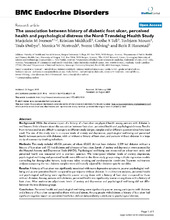| dc.description.abstract | Background: While the adverse impact of a history of a foot ulcer on physical health among persons with diabetes is well known, little is known about the association between foot ulcer, perceived health and psychological distress. Results from various studies are difficult to compare as different study designs, samples and/or different questionnaires have been used. The aim of this study was to compare levels of anxiety and depression, psychological well-being and perceived health between persons with diabetes, with or without a history of foot ulcer, and persons without diabetes in a large study of community-dwelling individuals. Methods: This study included 65,126 persons, of whom 63,632 did not have diabetes, 1,339 had diabetes without a history of foot ulcer and 155 had diabetes and a history of foot ulcer. Levels of anxiety and depression were assessed by the Hospital Anxiety and Depression Scale (HADS). Psychological well-being was measured on a four-item scale, and perceived health was measured with a one-item question. We investigated whether levels of anxiety, depression, psychological well-being and perceived health were different in the three study groups using multiple regression models controlling for demographic factors, body mass index, smoking and cardiovascular conditions. Separate multivariate analyses comparing the two diabetes samples were additionally adjusted for diabetes-specific variables. Results: A history of foot ulcer was significantly associated with more depressive symptoms, poorer psychological wellbeing and poorer perceived health compared to participants without diabetes. In multivariate analyses, perceived health and psychological well-being were significantly poorer among those with a history of foot ulcer compared to those without diabetes. Among persons with diabetes, perceived health was significantly worse among those with a history of foot ulcer. After multivariate adjustment, levels of anxiety and depression and psychological well-being did not differ between the two diabetes groups. Conclusion: Perceived health and psychological well-being were significantly poorer among participants with diabetes and a history of foot ulcer compared to those without diabetes. Among people with diabetes, a history of foot ulcer had significant negative impact on perceived health but did not independently contribute to psychological distress. | en_US |
